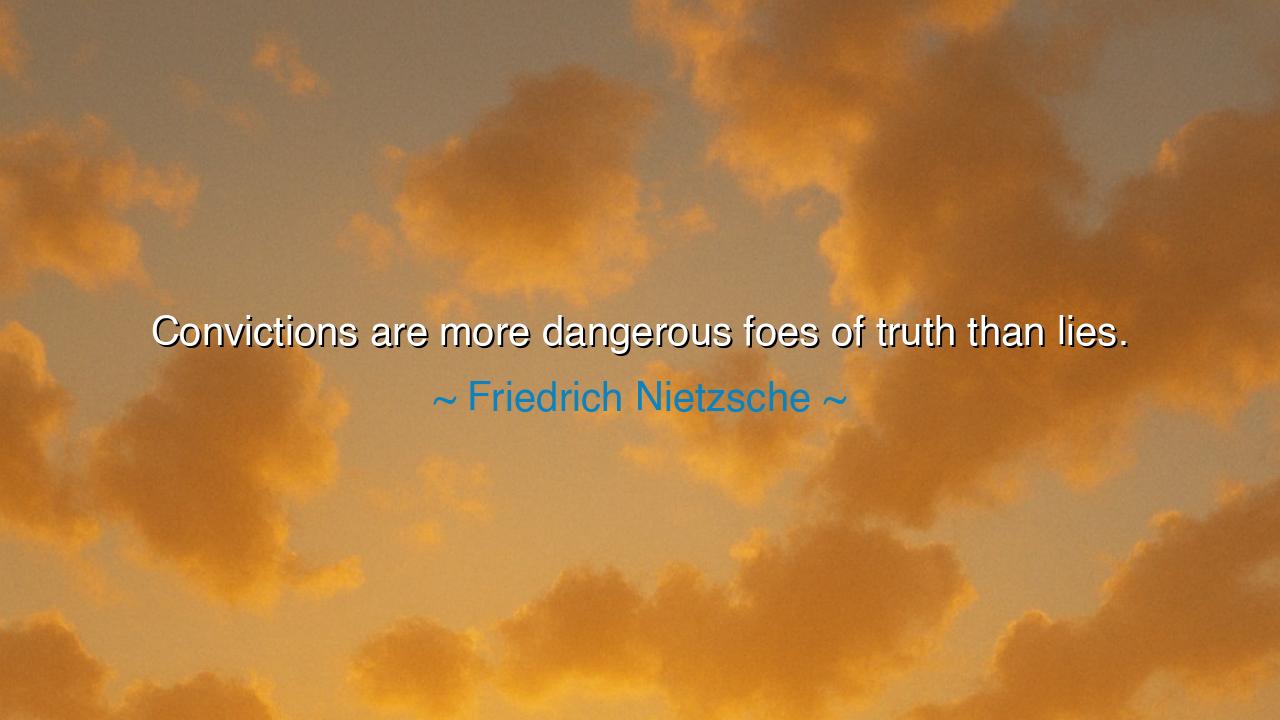
Convictions are more dangerous foes of truth than lies.






Friedrich Nietzsche, the philosopher who pierced illusions with the blade of his thought, once declared: “Convictions are more dangerous foes of truth than lies.” At first, these words sound strange. How could convictions, those beliefs we hold dearest, be more perilous than outright lies? Yet Nietzsche saw deeper than most. A lie, once revealed, can be cast aside. But a conviction, fiercely held, binds the soul with chains so strong that even truth itself struggles to break them.
The origin of this insight lies in Nietzsche’s lifelong war against dogma. He lived in an age where society clung to traditions, creeds, and inherited “truths” without question. He saw how men, persuaded of their own righteousness, refused to examine or test their convictions. To him, this stubborn certainty was more dangerous than falsehood, for the liar knows he deceives, but the man of conviction believes he already possesses truth. Against such certainty, reason and evidence often crash like waves against a cliff.
History testifies to the weight of Nietzsche’s warning. Consider the Inquisition of medieval Europe. Here, men of fierce conviction burned others at the stake, believing they defended God’s truth. Their error was not born of lies, but of certainty so rigid it could not hear correction. Lies might have been disproved; convictions silenced all dissent. Thus, rivers of blood were shed not for falsehoods men knew to be false, but for convictions they mistook for eternal truth.
Or recall the tragedy of the American Civil War. For generations, many in the South clung to the conviction that slavery was natural and just. This was not a mere lie, but a belief woven into their identity, culture, and economy. When challenged by the truth of human equality, they resisted with all their might. Millions suffered because convictions—unyielding, unexamined—stood as greater enemies to truth than the lies of opportunists. Here again, Nietzsche’s words ring prophetic.
The lesson of this saying is both humbling and fearsome. It warns us that our greatest enemy may not be the deceiver outside us, but the untested convictions within us. A lie can be unmasked, but a conviction must be wrestled with in the silence of conscience. We must learn to doubt even ourselves, to question our most cherished beliefs, not out of weakness but out of devotion to truth. For truth is not served by stubbornness, but by humility—the willingness to be corrected, even at the cost of pride.
Thus, Nietzsche’s wisdom challenges us to live as seekers, not as zealots. Hold your beliefs lightly enough that they may be tested, and strongly enough that, if proven true, they may guide you. Beware of certainty that silences inquiry. When confronted with new knowledge, do not harden your heart; listen, reflect, and be willing to change. For the soul that clings to conviction without examination closes the very door through which truth might enter.
Practically, this means cultivating habits of openness. Engage with those who disagree, not to conquer them, but to test yourself. Read not only what confirms your opinions, but also what challenges them. In discussions, ask: “Could I be wrong?” In decisions, examine whether your conviction is born of truth, or of fear, pride, or tradition. This is not weakness, but strength—the strength to let truth prevail even if it overturns your deepest assumptions.
So let Nietzsche’s words echo in your heart: convictions are more dangerous foes of truth than lies. Lies can be fought, exposed, and defeated. But convictions, if left untested, can blind generations, chain nations, and bury truth beneath centuries of error. Therefore, walk the path of humility. Seek truth above all else, even above the comfort of your own beliefs. In this lies the way of freedom, and in this lies the light that no conviction, however strong, can extinguish.






H7Thanh Hung 7/9
Nietzsche’s view that convictions are more dangerous than lies brings up an interesting question about the role of certainty in our lives. While lies can be identified and corrected, convictions are often deeply ingrained and harder to challenge. Can we ever separate our sense of identity from our convictions, or is our conviction about truth what gives us purpose and direction in life?
Aanh
This quote by Nietzsche feels especially relevant in today's world, where people seem to hold onto their convictions more tightly than ever. It makes me wonder: are we seeing more harm in society today because of unyielding convictions? Could open-mindedness and the ability to question one’s own beliefs be a solution to some of the polarization we’re experiencing?
TTAn Nguyen Thi thuy
Nietzsche’s idea that convictions hinder truth is thought-provoking. It makes me question how often we hold on to beliefs without questioning them, especially when society or culture reinforces them. Can we ever truly be free of conviction, or is it part of being human to have deeply held beliefs? How do we challenge convictions without losing our sense of purpose or identity?
NNNhu Ngoc
I find Nietzsche’s statement about convictions being more dangerous than lies intriguing. It makes me think about how our personal biases and beliefs can skew our perception of truth. Could it be that we often mistake conviction for truth, simply because we believe so strongly in something? How do we navigate the space between having strong beliefs and remaining open to the possibility that we might be wrong?
Nnguyenngotrongphuc
Nietzsche’s claim that convictions are more dangerous to truth than lies is striking. It suggests that strong beliefs can sometimes blind us to the truth, as we may become so committed to our ideas that we refuse to consider new evidence or perspectives. But are convictions always inherently harmful, or do they serve a necessary purpose in guiding our actions? How do we distinguish between healthy conviction and rigid dogmatism?